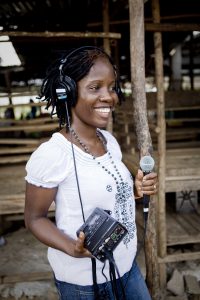 First off, a confession: even as the oil industry in Liberia made a lot of news in our country in the years from 2010, as a practicing journalist I knew very little about it. Like most of my peers, all I ever knew reporting on the sector came at the mercy of the National Oil Company of Liberia for a press release which only said all the wonderful things Nocal was doing, in its words, to better the lives of Liberians. But it was all history when New Narratives in collaboration with Thomson Reuters Foundation trained and empowered us to view and report the sector from all angles.
First off, a confession: even as the oil industry in Liberia made a lot of news in our country in the years from 2010, as a practicing journalist I knew very little about it. Like most of my peers, all I ever knew reporting on the sector came at the mercy of the National Oil Company of Liberia for a press release which only said all the wonderful things Nocal was doing, in its words, to better the lives of Liberians. But it was all history when New Narratives in collaboration with Thomson Reuters Foundation trained and empowered us to view and report the sector from all angles.
I must admit the thought of venturing into the oil and gas sector was challenging but my colleagues and I – chosen from among Liberians best journalists – believed in our ability to always do better. As intimidated as we felt, this was the one thing that kept us moving.
Through the 18 months in the program we’ve come to understand the oil sector and reporting on it from another level. We’ve learned to investigate and follow up on most of what the authorities claimed was happening. We’ve also followed up on projects they were undertaking in the interest of the people and country at large. What we found was far different from what was coming out in Nocal’s press releases.

Reporting the sector in the last 18 months has been interesting, challenging and worth doing. Why do I say so? For example in 2016 I traveled to Sanniquillie to check out the housing units Nocal claimed to have built for low income earners. The National Oil Company’s website claims to this day that it built 30 units, in three counties, and set up a scheme with the local housing authorities to offer low interest and affordable loans to local people. What we found was something different.
Our investigation established that the locals were in no way capable of owning any of the units because they were too expensive for them to afford. As a result the government was giving the units out to government ministries and agencies operating in the county.
In another important story I investigated the NOCAL proclaimed Johnsonville projects. NOCAL stated on its website that it built hand pumps and pit latrines in Johnsonville. But after I visited all seventeen communities in Johnsonville and interviewed residents and authorities it became clear that the claim made by Nocal was false. No-one had ever seen or heard of the donations. Indeed, in a clear indication of the disconnect between Nocal and the people it claimed to be serving, leaders in the community were stunned to hear that the claim was on the website. They had never seen it.
Perhaps Nocal authorities believed the donations had been made but they had not made their way to communities on the ground. Nocal did not respond to requests for explanation at the time but I hope to follow up on where the money went in future reporting. We have heard that a General Auditing Commission audit has identified the amount that was allotted for the projects but it has yet to be released. Meanwhile the claim remains on Nocal’s website.

Other colleagues in the program revealed equally disturbing stories. Hundreds of Nocal scholars had seen scholarships withdrawn in various parts of the country. Reporting by me, Mae Azango, Jefferson Massah of Radio Gbarnga saw them reinstated in some cases. James Harding Giahyue reported that Nocal workers had missed out on agreed severance pay. His reporting helped ensure they were paid. Reporting by Jefferson Massah at Radio Gbarnga and Anthony Stephens at Power TV showed how frustrated lawmakers and ordinary Liberians felt at their limited knowledge of the sector and how difficult that lack of knowledge made it for them to do their job overseeing the sector. Giahyue, Azango and Tecee Boley of Okay FM also showed the environmental and health damage caused by the oil industry. An investigative story about the shift from fossil fuel to renewable energy amidst the plummeting of oil prices on the world market by Giahyue was posted on websites of those in the business in the country as examples for the value of renewable energy.
We also found some good the industry has done. Many small businesses in rural Liberia were indebted to the Corporate Responsibility Projects run by Chevon according to a report by Jefferson Massah for Radio Gbarnga. Scores of Liberians received exceptional educations overseas in geology and hydrocarbon engineering and are playing an important role in the industry today.
OK Lib. Some Liberian Journalists View of the Oil Sector
Along the way we got harsh feedback from some. We were threatened with legal action from those high up in Nocal. But we were excited and never deterred because we knew we were doing the right thing and reporting the facts. To this date we are yet to be taken to court. We trust we never will as long as we report the facts and give those we identify as being accused of misdeeds a right to reply. We hope such reporting will make those who are thinking of stealing Liberians rightful income think twice.
Working with other colleagues has been extremely rewarding as we teamed together doing stories which produced results we never anticipated. Members of the team have unearthed impressive stories winning the admiration of the citizenry, which has made us proud, and thankful for being a part of the whole.
Most of all it feels good hearing form citizens both in high and low places how impressed they have been with the work we have done so far unearthing the good and bad in the oil sector.
To conclude, this program has widened my horizons about the oil sector in Liberia and most of all it has given me the courage to believe in myself and report on any sector in my journalism career no matter how big it seems.
